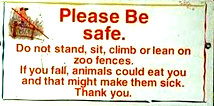Ever since Robert Scoble declared Facebook the new Rolodex, everybody has been giving it ample attention. Forget the “bright shining object” syndrome that seems to have overtaken social media; when Scoble talks about Facebook and the end of e-mail, it reads like social opium with no thought necessary.
Well, he’s wrong. Facebook will never be the new Rolodex and e-mail is here to stay. Why’s that? Two words: Harry Joiner.
Joiner is a leading e-commerce recruiter who writes the popular Marketing Headhunter blog. He used the Facebook UI to “slurp up” contacts in his Gmail address book (all 4,600 names) and then sent them all Facebook invitations (much like similar platforms). He was banned for it without warning.
Plenty of people have weighed in while I’ve danced around the issue for a few days. Marketing Headhunter has captured most of those comments right here. So, there isn’t much more to rehash, except one thing.
Since Joiner is not allowed on Facebook, what good is Facebook to me if he happens to be in my Rolodex, electronic or otherwise?
Do I keep a second Rolodex just for Joiner and anyone else who happens to be banned without warning? Or what if I trust Facebook to be my new Rolodex and they decide to ban me? All my contacts will be lost, gone, stolen away?
Look, there really isn’t anything wrong with trying out the newest shiny object in social media. (I only do it out of self-defense because some clients have questions after Scoble and company make outrageous claims.) However, all of this reminds me of the stock market in the 1980s. Every stock seemed hot because the economy was hot. A few years later, we quickly learned that not all hot stocks had value. Neither do all bright shiny objects.
Maybe it’s time for boiler room shiny object brokers to have a reality check before they cause a bust.
The truth is that most (not all) social media folks only talk up the services they excel at because it makes them feel good to be on the leading edge of something, anything, and everything. It is not prudent to trust one online service application with all your contact information nor is it prudent to attempt to gain a foothold in all them all. Most people (even business people who aren’t ignorant or whatever social media experts call them) are still learning their way around e-mail and Google let alone knowing anything about social media beyond MySpace teacher scandals. And, as much as Scoble has something to lend, sometimes he cannot see the forest for his focus is on the trees.
As for Facebook, there is nothing wrong with it when it works as a social network in the fast-growing bubble of all social networks. But it seems to me that there is something wrong with it in its terms of service, enforcement policy, and its inability to see that it has created a minor crisis that will continue to grow as more members are banned without reasonable explanation. My Rolodex? I think not. Another tool? Maybe.

Well, he’s wrong. Facebook will never be the new Rolodex and e-mail is here to stay. Why’s that? Two words: Harry Joiner.
Joiner is a leading e-commerce recruiter who writes the popular Marketing Headhunter blog. He used the Facebook UI to “slurp up” contacts in his Gmail address book (all 4,600 names) and then sent them all Facebook invitations (much like similar platforms). He was banned for it without warning.
Plenty of people have weighed in while I’ve danced around the issue for a few days. Marketing Headhunter has captured most of those comments right here. So, there isn’t much more to rehash, except one thing.
Since Joiner is not allowed on Facebook, what good is Facebook to me if he happens to be in my Rolodex, electronic or otherwise?
Do I keep a second Rolodex just for Joiner and anyone else who happens to be banned without warning? Or what if I trust Facebook to be my new Rolodex and they decide to ban me? All my contacts will be lost, gone, stolen away?
Look, there really isn’t anything wrong with trying out the newest shiny object in social media. (I only do it out of self-defense because some clients have questions after Scoble and company make outrageous claims.) However, all of this reminds me of the stock market in the 1980s. Every stock seemed hot because the economy was hot. A few years later, we quickly learned that not all hot stocks had value. Neither do all bright shiny objects.
Maybe it’s time for boiler room shiny object brokers to have a reality check before they cause a bust.
The truth is that most (not all) social media folks only talk up the services they excel at because it makes them feel good to be on the leading edge of something, anything, and everything. It is not prudent to trust one online service application with all your contact information nor is it prudent to attempt to gain a foothold in all them all. Most people (even business people who aren’t ignorant or whatever social media experts call them) are still learning their way around e-mail and Google let alone knowing anything about social media beyond MySpace teacher scandals. And, as much as Scoble has something to lend, sometimes he cannot see the forest for his focus is on the trees.
As for Facebook, there is nothing wrong with it when it works as a social network in the fast-growing bubble of all social networks. But it seems to me that there is something wrong with it in its terms of service, enforcement policy, and its inability to see that it has created a minor crisis that will continue to grow as more members are banned without reasonable explanation. My Rolodex? I think not. Another tool? Maybe.






























